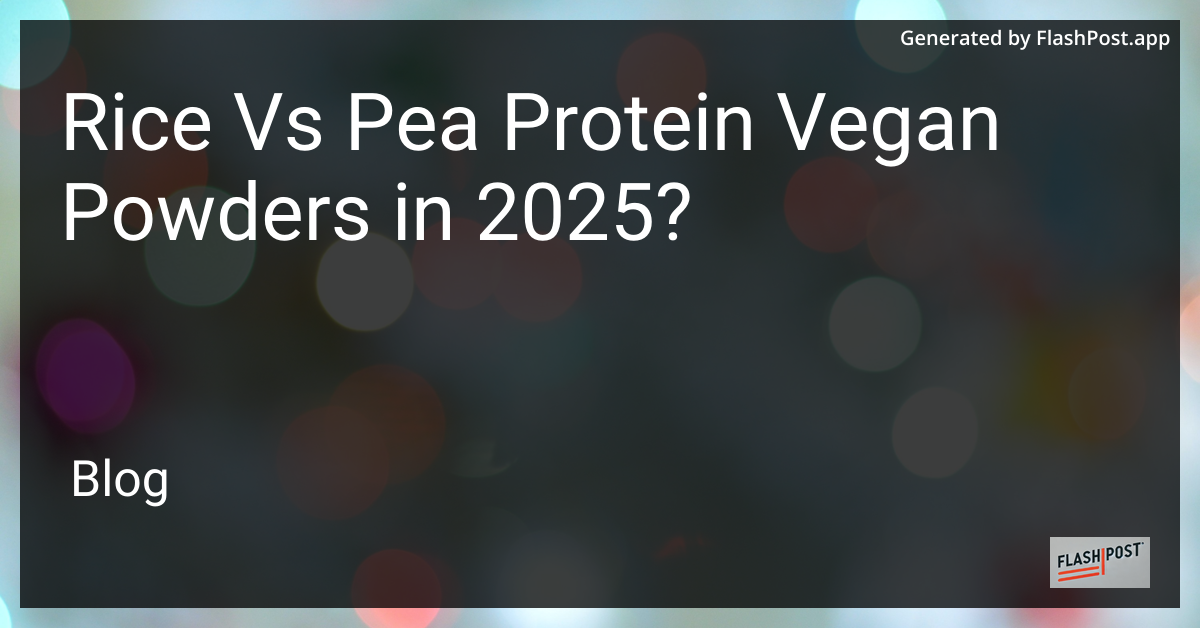
Rice vs Pea Protein Vegan Powders in 2025
As the demand for plant-based nutrition continues to surge, the popularity of vegan protein powders has reached new heights, especially in 2025. Among the most preferred options, rice and pea protein powders stand out as prominent choices for fitness enthusiasts and health-conscious individuals. But how do these two compare, and which one is the optimal choice for your dietary needs? Let's delve into the specifics to find out.
Best Vegan Protein Powders to Buy in 2025
| Product |
Features |
Price |

Orgain Organic Vegan Protein Powder, Vanilla Bean - 21g Plant Protein, 4g Prebiotic Fiber, No Lactose Ingredients, No Added Sugar, Non-GMO, For Shakes & Smoothies, 2.03 lb (Packaging May Vary) |
- Organic protein blend: 21g plant-based protein, 1g sugar per serving.
- Vegan, gluten-free, Non-GMO: no artificial additives or preservatives.
- Versatile & customizable: mix with beverages or add to recipes easily. |
Check Price
 |

Orgain Organic Vegan Protein + 50 Superfoods Powder, Vanilla Bean - 21g Plant Based Protein, 8g Prebiotic Fiber, No Lactose Ingredients, Gluten Free, No Added Sugar, Non-GMO, 2.02 lb |
- Clean Nutrition: 21g plant protein, 1g sugar, 50 superfoods per serving.
- Pure & Safe: USDA Organic, vegan, gluten-free, and Non-GMO certified.
- Versatile Use: Blend, mix, or bake for a protein-packed boost any time! |
Check Price
 |

Orgain Organic Vegan Protein Powder, Creamy Chocolate Fudge - 21g Plant Protein, 6g Prebiotic Fiber, Low Net Carb, No Lactose Ingredients, No Added Sugar, Non-GMO, For Shakes & Smoothies, 2.03 lb |
- Clean Ingredients: 21g organic protein, 0g sugar, full amino acid profile.
- Vegan & Non-GMO: Higher standards with no unwanted additives or allergens.
- Versatile Use: Mix into drinks, oats, or baked goods for a protein boost. |
Check Price
 |

Orgain Organic Vegan Protein + 50 Superfoods Powder, Creamy Chocolate Fudge - 21g Plant Based Protein, 9g Prebiotic Fiber, No Lactose, Gluten Free, No Added Sugar, 2.02 lb (Packaging May Vary) |
- Plant-Powered Nutrition: 21g protein, 1g sugar—complete amino acids!
- Clean Ingredients: USDA Organic, vegan, gluten-free, no artificial additives.
- Versatile Usage: Mix in shakes, bake, or enjoy with your favorite liquids! |
Check Price
 |

Vega Original Essential Protein - 25g Plant-Based Protein, Creamy Vanilla, 20 Servings, Vegan Non-GMO Drink Mix, Smoothie & Shake Ready, Gluten Free, Dairy Free, 32.5oz (Packaging May Vary) |
- 25g pea protein per serving—more than leading brands!
- Zero sugar and 3g fiber for healthy, guilt-free nutrition.
- Non-GMO, vegan, gluten-free; clean ingredients you can trust! |
Check Price
 |
Nutritional Profiles
Rice protein powder, derived from brown rice, is rich in essential amino acids, making it a suitable protein source for vegans. It is easily digestible and hypoallergenic, making it appealing for those with food sensitivities.
On the other hand, pea protein powder, extracted from yellow split peas, is known for its high protein content and excellent amino acid profile. It contains all nine essential amino acids and is particularly rich in branched-chain amino acids (BCAAs), which play a critical role in muscle growth and recovery.
Benefits and Considerations
The benefits of organic electrolyte powders in 2025 complement the nutritional advantages offered by vegan protein powders. Both rice and pea protein powders are gluten-free and provide a clean source of nutrition, devoid of dairy, soy, or artificial additives.
While rice protein is ideal for those with specific allergies, pea protein boasts a better taste profile and mixes well into smoothies and shakes. Additionally, pea protein is often considered more sustainable, as peas generally have a lower environmental footprint compared to rice cultivation.
Choosing the Right Protein
When selecting between rice and pea protein, it's essential to consider your specific lifestyle and dietary goals. For muscle building and recovery, pea protein may have a slight edge due to its BCAA content. However, for those with allergies or sensitivities, rice protein could be the safer option.
Conclusion
The battle between rice and pea protein vegan powders in 2025 ultimately boils down to personal preference and dietary requirements. Both protein sources offer significant health benefits, making them excellent choices for vegans and non-vegans alike. For further insights, explore more on electrolyte powders for exercise and learn how they can complement your protein intake strategies.
Additionally, if you're exploring the broader spectrum of nutrition, consider the ongoing debate on mushroom powders vs fresh mushrooms for a holistic approach to dietary wellness.










